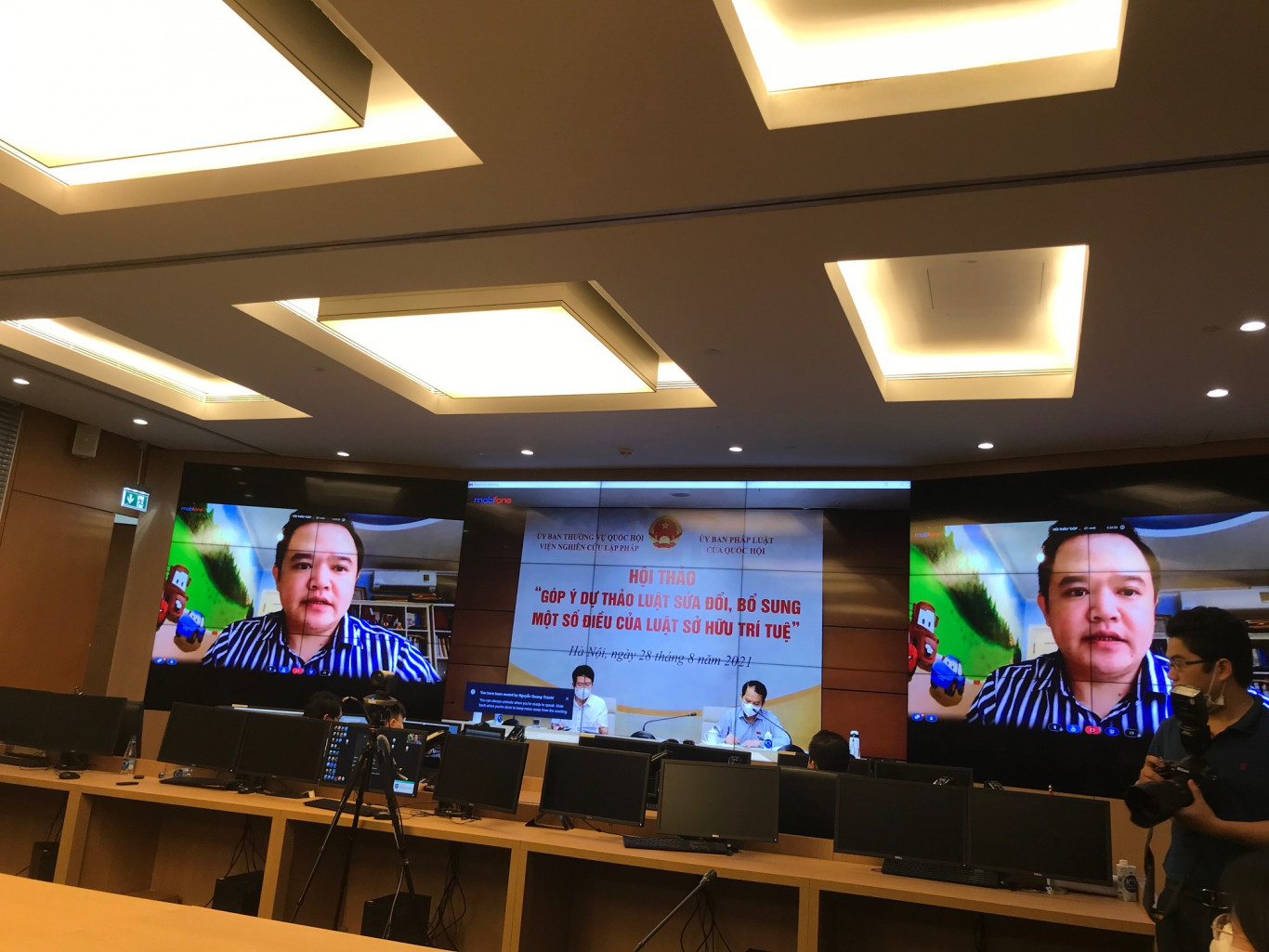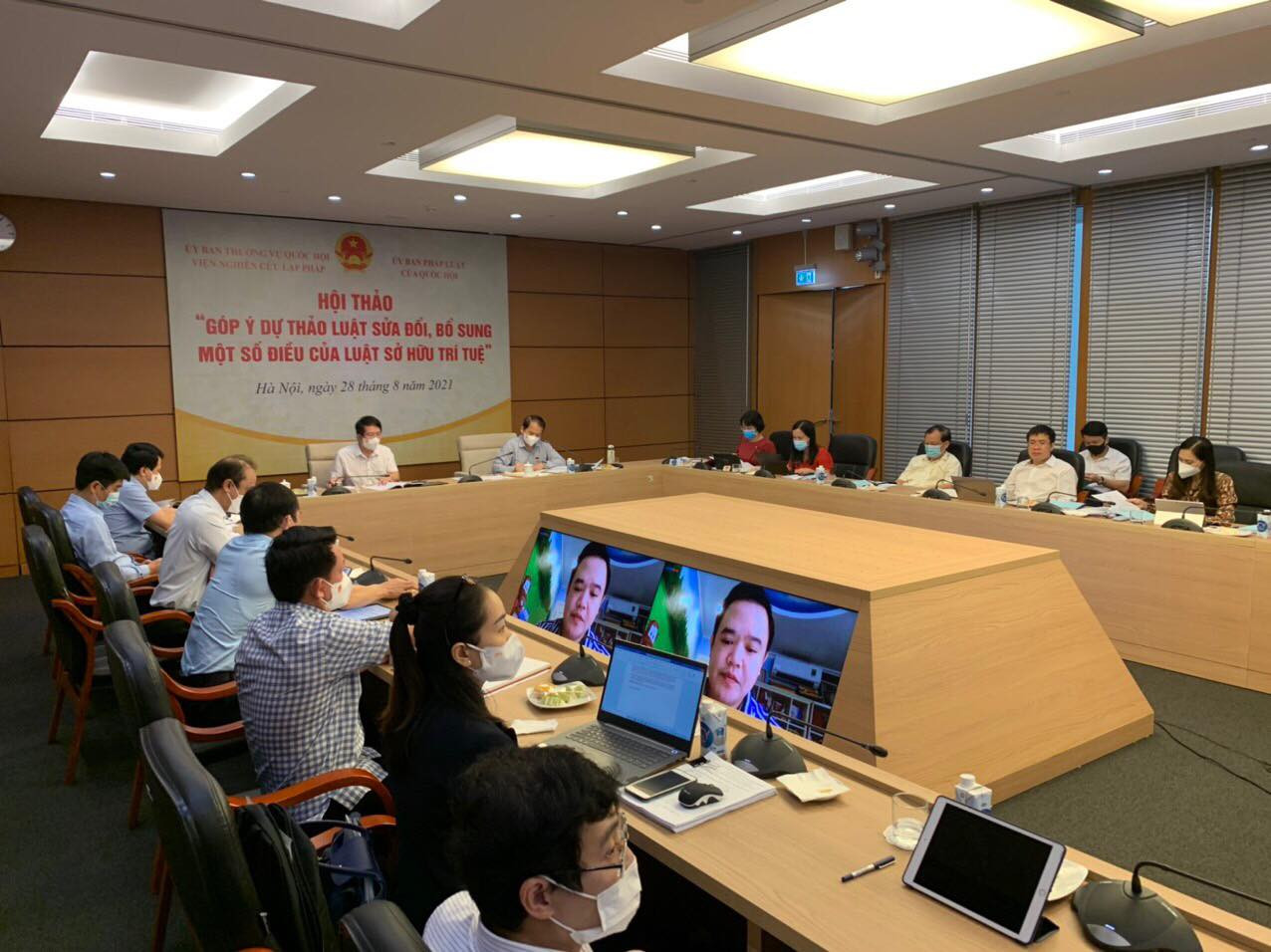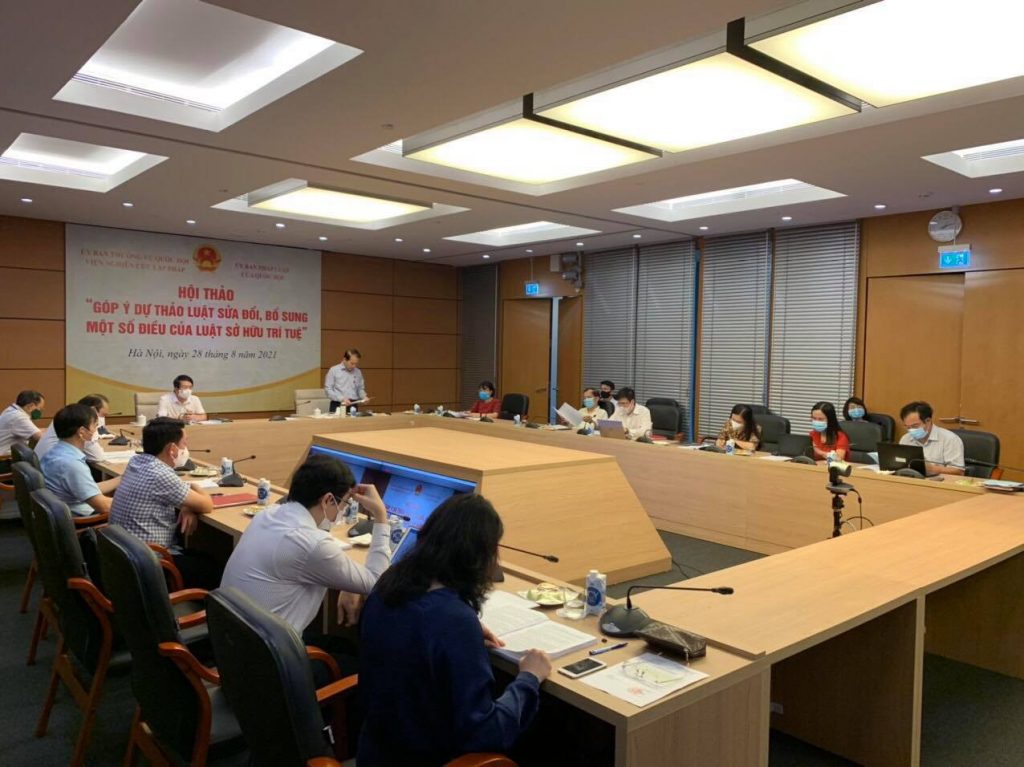The Vietnamese government has just proposed to amend seven groups of policies on intellectual property law before the National Assembly. Accordingly, the amendments if approved will create a major change in Vietnam’s intellectual property law. Here are the featured issues that the amended Vietnam intellectual property law addresses.
1. Criminal handling of the crime of Infringing upon industrial property rights without the victim’s request
This is one of the highlights of the proposed amendment of the Criminal Procedure Code related to crimes in the field of intellectual property. Accordingly, Clause 1, Article 155 is proposed to be amended and supplemented in the direction of allowing the competent authority to prosecute a criminal case for the crime of infringing upon industrial property rights without the victim’s request.
According to the Judiciary Committee, Clause 1, Article 226 of the Penal Code provides for the crime of infringing upon industrial property rights for both trademarks and geographical indications. The CPTPP stipulates that member countries allow competent authorities to take the initiative to take legal action without the need for a formal lawsuit from a third party or a right holder with an infringement of their trademark.
The Agreement does not impose requirements on geographical indications. Thus, if the proposed amendment or annulment of the reference to the whole of Clause 1, Article 226 of the Penal Code, as proposed, will be more extensive than the requirements of the CPTPP Agreement.
Through discussion, the majority of opinions of the Judiciary Committee suggested that only Clause 1, Article 155, Clause 8, Article 157 of the Criminal Procedure Code be amended to remove the reference to Clause 1, Article 226 of the Penal Code on acts of infringing upon industrial property rights to trademarks, without modifying regulations related to geographical indications.
The consistent criminal policy so far is that for acts of infringing upon industrial property rights on geographical indications (under the category of less serious crimes) specified in Clause 1 of the corresponding articles of the Penal Code, only prosecuted at the request of the victim. This is based on the consideration of the interests of the victims, giving them the right to choose whether or not to deal with criminal measures.
In case of committing a more serious crime in Clause 2 of this Article, according to the procedural law so far, the agency competent to conduct the proceedings shall proactively initiate a prosecution regardless of the request for initiation of criminal proceedings of the victim.

2. Trademark
2.1 Additional subject protected as trademarks: Sound trademarks
Regulations amending and supplementing Clause 1, Article 72: Trademarks are protected if the following conditions are met: “1. A sign that is visible in the form of letters, words, drawings, pictures, holograms or a combination thereof, represented by one or more colors; or a graphical representation of sound.”
When recognizing sound as a type of trademark, the issue of trademark evaluation and recognition is a big challenge for state agencies. Because it is necessary to clearly determine what type of sound is eligible for registration, can sounds that are too simple such as alarm bells, birdsong, etc. be protected as trademarks?
2.2 Regarding the term “bad intention” as additionally provided at Point a, Clause 1, Article 96, Vietnam IP Law
The concept of “bad intentions” was mentioned in Article 96 as a basis for the invalidation of a trademark protection title. Specifically, the Draft offers the following:
“43. To amend and supplement several clauses of Article 96 as follows:
a) To amend Clause 1 and add Clause 1a as follows:
“1. A protection title shall be completely invalidated in the following cases:
a) The applicant for registration of a mark with malicious intent;”
2.3 Regarding the recognition of “copyright” as a basis for rejecting a registered trademark
In the draft Intellectual Property Law, copyright was initially recognized as a basis for the refusal of trademarks. Specifically, the draft offers the following:
“33. Amending and supplementing a number of contents of Clause 2, Article 74 as follows:
[…]
h) Add point o, point p as follows:
[…]
p) Signs identical or confusingly similar to names and images of characters and images in works covered by copyright protection of others that were widely known before the filing date, except with the permission of the owner of that work.”
3. Inventions and Designs
To encourage the creation, exploitation, and dissemination of inventions (patent), industrial designs, and layout designs created from the State budget, add some regulations to control inventions using genetic resources and traditional knowledge about genetic resources. As follows:
3.1 Amending Clause 1, Article 60 (Novelty of Inventions) to clarify that an invention in a patent application with a later filing date or priority date is also considered to have lost its novelty if it has already been disclosed in a patent application with an earlier filing or priority date but published on or after the filing or priority date of that patent application.
3.2 Amendment to Article 86 (Rights to register inventions, industrial designs, layout designs) to be consistent with Article 86a; clearly stipulate that organizations and individuals managing genetic resources are also considered as investment organizations.
3.3 Supplementing Article 86a stipulates the right to register inventions, industrial designs, and layout designs are the results of a science and technology task using the State budget belong to the organization in charge of the science and technology task and this organization will become the owner; supplementing Article 133a with regulations on the State assigning registration rights to other organizations or individuals or making public announcements to prevent other organizations and individuals from registering to obstruct the exploitation); Article 136a (obligation of the lead organization; supplementing Clause 6, Article 139 on conditions restricting the transfer of industrial property rights).
3.4 Supplementing Article 89a stipulates that inventions created entirely in Vietnam by Vietnamese organizations and individuals, if they are in technical fields that have an impact on security and defense, then they may only file a patent application abroad when they have filed a patent application in Vietnam and after the expiry of 6 months from the date of filing the application, it is not determined as a secret invention or in case the invention is determined to be a State secret, the application may only be filed abroad under the guidance of the Government.
3.5 Supplementing Article 131a on the mechanism of compensating the patent owner for the delay in the issuance of the marketing authorization of pharmaceutical products under the mechanism of not having to pay the fee for using the patent for the delayed period as stated in Resolution 102/2020/QH14 on the ratification of the EVFTA Agreement.
3.6 Supplementing point d, clause 1 of Article 145 (Bases for compulsory licensing of inventions) on the grounds for compulsory licensing, whereby compulsory licensing of inventions can be requested to meet the needs of the importing country eligible under the TRIPS Agreement.
3.7 Amending and supplementing Clause 1, Article 146 (Conditions to restrict the right to use inventions transferred under compulsory decisions) according to the mechanism of Article 31bis of the TRIPS Agreement.
3.8 Amending Clause 1, Article 147 (Jurisdiction and procedures for licensing the right to use inventions under compulsory decisions), to add the case specified at Point dd, Clause 1, Article 145 of this Law.

4. Regarding Copyright and related rights in Vietnam
Ensure clear regulations on authors, copyright holders, performers, and related rights holders in cases of assignment or transfer of copyright and related rights.
Regulations related to the identification of property rights holders (owners, authors, performers) are clearly and explicitly specified.
Eg:
- Amending and supplementing a number of concepts in Article 4 (Explanation of terms), specifically the concepts of “derivative works”, “published works, phonograms, and video recordings”, copy”, “broadcast”, “industrial design”, “well-known trademark”, “geographical indication”; Eliminate the concept of “affiliate trademark”; Adding the words “royalties”, “effective technological measures to protect rights”, “rights management information” and “communication to the public of works, performances, phonograms, and video recordings”, “secret invention”.
- Supplementing Article 198a (Assumption of copyright and related rights) to provide more clarity on authors, performers, producers of phonograms and video recordings, broadcasting organizations, and producers of works cinema, publishing houses, facilitating practical implementation and improving the efficiency of rights protection enforcement activities in accordance with international commitments, and at the same time legalizing the provisions of Article 6 of Decree No. 105/2006/ND-CP on the content of assumptions about copyright, related rights.
- Supplementing Article 198b (Responsibility of intermediary service providers in the protection of copyright and related rights in the Internet and telecommunications network environment) to be consistent with the commitments in the EVFTA Agreement; clearly stipulate cases of exemption from legal liability for acts of infringing upon the copyright, related rights.
- Supplementing Article 13a (Authors, co-authors), which regulates who is considered as authors and co-authors.
- Amendment to Article 19 (Moral Rights), thereby clarifying the content of the rights to be named on the work, named when the work is published, used unless it is mandatory because of the way in which the work is used, etc.
- Amendment to Article 20 (Economic Rights), to clarify the content of performance rights; the right to copy and where the right to copy does not apply; broadcasting and communication rights; the right to distribute, to import for distribution and in cases where the right to distribute is not applicable; rental rights.
- Amendment to Article 21 (Copyright for cinematographic works and theatrical works), which clearly stipulates that each group of creative participants shall enjoy rights corresponding to their contribution to the creation of cinematographic works, theatrical works; at the same time, legislate the provisions of Decree No. 22/2018/ND-CP on organizations and individuals investing in finance and material and technical facilities to create cinematographic works and theatrical can negotiate with the scriptwriter and director on naming and correcting the work.
- Amendment to Article 22 (Copyright for computer programs, data collection), thereby expanding the scope of “computer programs” to devices; at the same time, legislate the provisions of Decree No. 22/2018/ND-CP that authors and copyright holders for computer programs can agree in writing on the repair and upgrade of the computers program and organizations, individuals who are legally entitled to a copy of a computer program can make a backup copy.
5. Expansion of permission exception/fair use
Ensure an adequate and balanced level of protection of intellectual property rights in Vietnam. The Vietnamese Government proposes to add some exceptions and limitations (faire use) on copyright and related rights in order to harmonize the interests of related parties.
5.1 Exceptions that do not infringe copyright
1. Cases of published works usage that doesn’t require permission and paying royalties include:
a) Self-copy one copy for personal scientific research and study and not for commercial purposes, except for copying the whole or a substantial part of the work or copying by automatic copying equipment or other copying equipment installed for public use;
b) Reasonable copying of part of a work for personal teaching purposes and not for commercial purposes, except for cases where the work is published for teaching purposes;
c) Reasonable use of works for illustration in publications, sound recordings, video recordings, broadcasts for teaching purposes. This use may include the provision in an internal computer network, provided that technical measures are taken to ensure that only students, college students, and teachers participate in learning and teaching during that session have access to these works;
d) Using works in official activities of state agencies;
dd) Reasonably cite works without misleading the author’s intention to comment, introduce or illustrate in his work; to teach; to write newspapers, to be used in periodicals, broadcasts, documentaries;
e) Using works in library activities for non-commercial purposes, including copying works stored in libraries for preservation; reasonably copying part of a work for others to serve research and study; copy or transmit work stored for use in related libraries over computer networks;
g) Performing theatrical, musical, dance, and other art performances in cultural activities and non-commercial propaganda activities;
h) Taking pictures and broadcasting works of fine art, architecture, photography, or applied art displayed in public places in order to introduce the images of such works;
i) Importing copies of other people’s works for private use;
k) Reproduction by republishing in newspapers, periodicals, broadcasting, or other forms of communication to the public of lectures, speeches, and other speeches presented to the public to the extent appropriate fit for informational purposes;
l) Taking pictures, photographing, recording, and broadcasting events for the purpose of news reporting, using works heard or seen in that event.
m) People with visual impairments, people with disabilities who cannot read print and other disabled people who cannot access works to read in the usual way (hereinafter referred to as disabled people), caregivers who care for people with disabilities, organizations that are permitted by the Government to use works according to the provisions of Article 25a of this Law.
2. Organizations and individuals using works specified in Clause 1 of this Article must provide information about the author’s name and the source and origin of the work.
3. The copying specified in Clause 1 of this Article does not apply to architectural works, works of art, or computer programs; to make an anthology of works.
4. The Government shall detail Clause 1 of this Article.
5.2 Disability non-infringement exception (faire use)
This is a step forward for Vietnam in this revised draft. As follows:
- Persons with disabilities, custodians, and caregivers of persons with disabilities have the right to copy, perform, or transmit a work in an accessible copy format when having legal access to the original or a copy of the work.
- An accessible format copy is a copy of a work rendered in an alternative format or format for persons with disabilities.
- A copy in an accessible format is for personal use only by persons with disabilities, and adjustments may be made to the work by making copies in an accessible format without alteration other than necessary changes to make the work accessible to people with disabilities.
- An organization authorized by the Government has the right to copy, distribute, perform, or communicate the work in an accessible copy format when it has legal access to the original or a copy of the work and operates not for profit.
- The organization authorized by the Government has the right to distribute or communicate copies in an accessible format of the work to the respective organization in accordance with the international treaties to which the Socialist Republic of Vietnam is a member without the permission of the right holder.
- An organization authorized by the Government has the right to distribute or communicate in accessible format copies of the work referred to in paragraph 1 of this Article to persons with disabilities in accordance with international treaties to which the Socialist Republic of Vietnam is a contracting party without the permission of the right holder.
- Before distribution or communication, this organization must take the necessary measures to ensure that copies in this accessible format are not used by anyone other than persons with disabilities.
- Persons with disabilities or caregivers of persons with disabilities or an organization authorized by the Government to make copies of works in an accessible format specified in Clause 1 of this Article may import copies in the accessibility of the work from the respective organizations as provided for in the international treaties to which the Socialist Republic of Vietnam is a contracting party for the benefit of persons with disabilities without the permission of the owner permission.
- The Government shall detail the conditions, order, and procedures for allowing organizations to exercise the rights specified in Clauses 2, 3, 4, and 5 of this Article.”
6. Maintain the mechanism to handle acts of infringement of intellectual property rights
The Government consulted the National Assembly on sanctioning administrative violations for acts of infringing upon intellectual property rights. According to the plan, administrative sanctions are only applied to acts of infringing upon the copyright, related rights, trademarks, geographical indications, and plant varieties. Acts of infringing upon the rights of patents, industrial designs, layout designs, trade names, business secrets, and unfair competition will only be handled by civil remedies. However, the final option adopted was to keep the current infringement handling mechanism unchanged, namely to maintain the current regulation that is administratively sanctioning all acts of infringing intellectual property rights.
ASL LAW is the top-tier Vietnam law firm for Intellectual Property Services. If you need any advice, please contact us for further information or collaboration.
|
***Other service of ASL LAW – full service Vietnam law firm *** |
||
|
|
||
|
Oversea investment consultancy for Vietnamese enterprises |
|
|
|
|
||
|
|
||
|
|
||
|
|
||
|
|
||
|
|
||
|
|
||
|
|
||
|
|
||
|
|
||
|
|
||
|
|
||
|
|
||
|
|
||
|
|
||
|
|
||
|
|

 Tiếng Việt
Tiếng Việt 中文 (中国)
中文 (中国)

